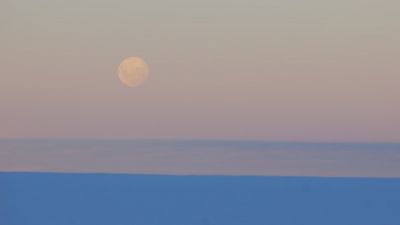
Live from Antarctica: Saturday February 7th
The last days have gone by in a blur of activity. The work days seem to be getting longer as the days get shorter. The pale opalescent light of the evening, forerunner of the first protosunsets as we move towards mid February, announces colder and colder by the day.
A certain rhythm has installed itself, even amongst our guests from the JARE 50 (the fiftieth Japanese Antarctic Research Expedition). The biologists have been going further and further afield in search of life in the white desert, with René to help them become accustomed to the conditions, and to point out interesting features. Cyrille (from the Musée d'Histoire Naturelle in Paris) keeps finding multi-limbed beasties that Jeroen has the uncanny knack of being able to see with the naked eye. To the ordinary mortal it is just dust.
Annick has found some cyanobacteria which we marvel over, magnified and strangely moving (as opposed to moving strangely) under the light of the microscope. Our ancestors, of sorts.
Alexander is busy grappling with the magnetometer, making late night calls to Tokyo as they troubleshoot some niggling little problem with the communication interface. Irina has managed to get the first results from the AWS and it can already be viewed on the internet site of the University of Utrecht. She has also managed to set up the ceilometer which means we can finally see if our guesswork with cloud heights was anywhere near the truth. Talking about clouds at dinner, I realise that nobody knows who The Carpenters were. Is celebrity so fickle? Are the seventies really the Stone Age? And in case you are wondering, no they were not a roaming band of minstrels with woodworking skills.... They just sang a song about clouds which only those sturdily resistant to ridicule would ever admit to knowing.
A sense of urgency is in the air. With the inauguration upcoming, the pressure is on to be ready, but also on to organise The Visit. Our Catering and Beverage Managers, as the cooks are now officially referred to, have kindly agreed to manage the event in a professional way, which means that we don't have to resort to hysteria just yet. We have to be nice to them so that they don't sulk, which would mean a total fiasco. We even let them go to the coast with the traverse team which is made up of Philippe H, Oli G, Alain Trullemans (cousin to Luc the Weather Guy), and Ronald (our Canadian retired doc and erstwhile camp Neatness Manager). Although it is difficult to survive without them, we want them to be happy. If they are happy, we are happy. We will oblige them to be happy. They form the Organisation Committee with Jacques Brassinne and I.
I, who am not really cut out for this kind of thing. An ordinary dinner party would throw me into a frenzy and here we are talking a plane load of guests. No room for nervous breakdowns here.
The weather too refuses to break, despite Christian from Neumayers helpfully optimistic phrasing, "overcast, becoming broken clouds" which, when translated, becomes "sunshine and lunch on the terrace" to our fatigued brains.
The D6 is late. Bad weather at Novo. We are waiting last minute deliveries of VUS (Very Useful Stuff) and Johan and I have taken to cabling the PLC (the neural networks of the virtual brain) under the tutelage of Jean Chalon and Wim Van Belle from Schneider Electric. At first sight, the nest of vipers (or Cape Puff Adders for the true aficionados of serpents) glistening in coils of black yellow and green, resolves itself into a system (an ingenious system I might add) for managing the energy demand. This is at the end of the pipe, where all the hard work of the technical team finally is tested. I am amazed by the trusting nature of my colleagues.
The nightmare vision gives way to hundreds and hundreds of neatly aligned filaments and connections (6000 by some counts, as each energy demand requires five separate cabling controls (10 wires) - for demand, for signalling, for alarms, for feedback and intervention). This means that 6000 things can go wrong with the system. We are reaching organic levels of complex operation.
Have we tamed the beast?
I hold my breath when the juice is put through the system. And then it works, and we all smile broadly despite the tension, the fatigue and the raw nerves. Jean and I ceremonially shake hands.
Another day in paradise?
Nighat Amin
Picture: International Polar Foundation - © International Polar Foundation
